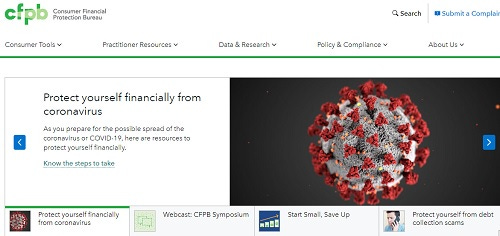We got your back, CFPB seems to say to credit bureaus; consumer group cries foul as late bills pile up

Consumers impacted by the coronavirus -- virtually everyone in America at this point -- might have trouble paying their bills this month. What will that do to their credit reports? Unfortunately, trouble lies ahead, and neither Congress nor the Consumer Financial Protection Bureau seem ready to stop it.
I wrote about Congress' half-measure of help with the CARES Act last week. On Wednesday, the CFPB issued a vaguely-worded "guidance" document that seemed more focused on providing cover for the credit bureaus than relief for consumers. The document "provides flexibility" for the bureaus as they investigate disputes, and clearly states it will not "bring an enforcement action against firms who exceed the deadlines."
It also encourages lenders to voluntarily provide payment relief to consumers, and to "report accurate information to the credit bureaus relating to this relief." Will this "accurate information" ultimately be good or bad for consumers who can't pay their bills right now? That remains to be seen. One reading of that guidance suggests that lenders who offer voluntary relief -- as opposed to the specific, mandatory relief directed by Congress -- will have that relief appear as a late payment on their credit report. As I've written before, consumers who have excellent credit see their scores drop the most from a single late payment.
https://bobsullivan.net/gotchas/the-better-your-credit-score-the-faster-it-falls-explaining-credit-score-damage-points/
“An unpaid collections tradeline of at least $100 to a consumer’s credit report will reduce a score of 680 by over 40 points and a score of 780 by over 100 points,” a CFPB report found several years ago. That means a single unpaid bill, reported as late, could turn a prime borrower into a subprime borrower.
Chi Chi Wu, a staff attorney at the National Consumer Law Center, is concerned many Americans will end up facing the double-whammy of income loss and ruined credit.
"For consumers who are current and manage to get an accommodation -- which involves getting through on the phone - the CARES Act will require lenders to keep reporting them as current. But everyone else is screwed, to use a technical term," Chi Chi Wu said.
In other words, there is relief for consumers who can get a lender to officially grant some kind of grace period before unpaid bills end up on their credit report. But anyone else is out of luck, legally, at the mercy of whatever the bureaus and the credit score makers decide to do later with coronavirus credit report black marks.
“The Consumer Financial Protection Bureau utterly failed in its job to protect consumers with this guidance, simply telling the credit bureaus and furnishers that they must comply with the newly enacted CARES Act and even getting wrong the meaningless protection for consumers in that Act," the National Consumer Law Center said in a statement. "Contrary to what the CFPB says, the CARES Act only helps a consumer avoid negative information on their credit report if they are not already behind in their payment when the creditor grants them relief.
“Instead of protecting consumers whose credit reports are being battered through no fault of they own, the CFPB is more concerned about relaxing deadlines for creditors, debt collectors and credit bureaus to fix problems when consumers dispute errors in their creditor reports. I don’t even know if the CFPB has the legal authority to do given that without engaging in formal rulemaking, and even the Bureau acknowledges that the guidance is non-binding," Wu said in the statement.
“The CFPB’s guidance does not provide one iota of assistance to consumers who are unable to reach their creditors because of long phone hold times, who are too overwhelmed by job losses or dealing with COVID-19 personally or helping afflicted family, or whose creditors are heartless enough to deny them relief. Instead, the CFPB provides a helping hand to creditors, debt collectors and credit bureaus, even though the latter are the number one source of complaints to the CFPB’s own Complaint Database. This is shameful beyond belief at a time when so many families and individuals are suffering, and it will make it much more difficult for them to recover financially for many years to come.”
Here's what the CFPB said in its guidance:
"The Act requires lenders to report to credit bureaus that consumers are current on their loans if consumers have sought relief from their lenders due to the pandemic. The Bureau’s statement informs lenders they must comply with the CARES Act. The Bureau’s statement also encourages lenders to continue to voluntarily provide payment relief to consumers and to report accurate information to credit bureaus relating to this relief. The continuation of reporting such accurate payment information produces substantial benefits for consumers, users of consumer reports, and the economy as a whole.
"The Bureau’s statement also provides flexibility for lenders and credit bureaus in the time they take to investigate disputes. The Bureau specifically states that it does not intend to cite in an examination or bring an enforcement action against firms who exceed the deadlines to investigate such disputes as long as they make good faith efforts during the pandemic to do so as quickly as possible.


